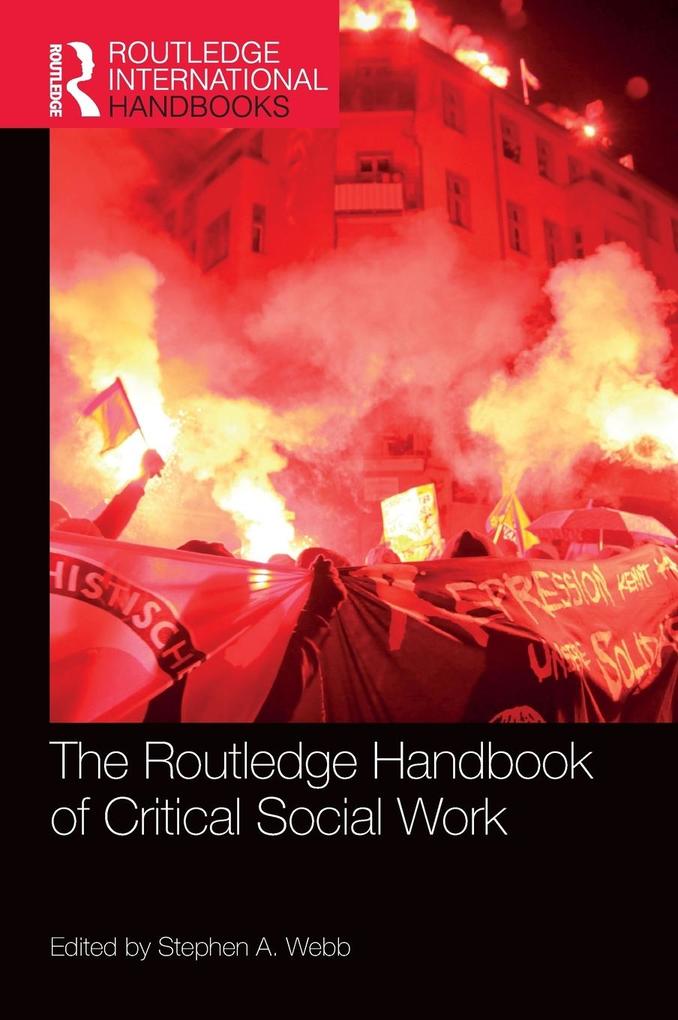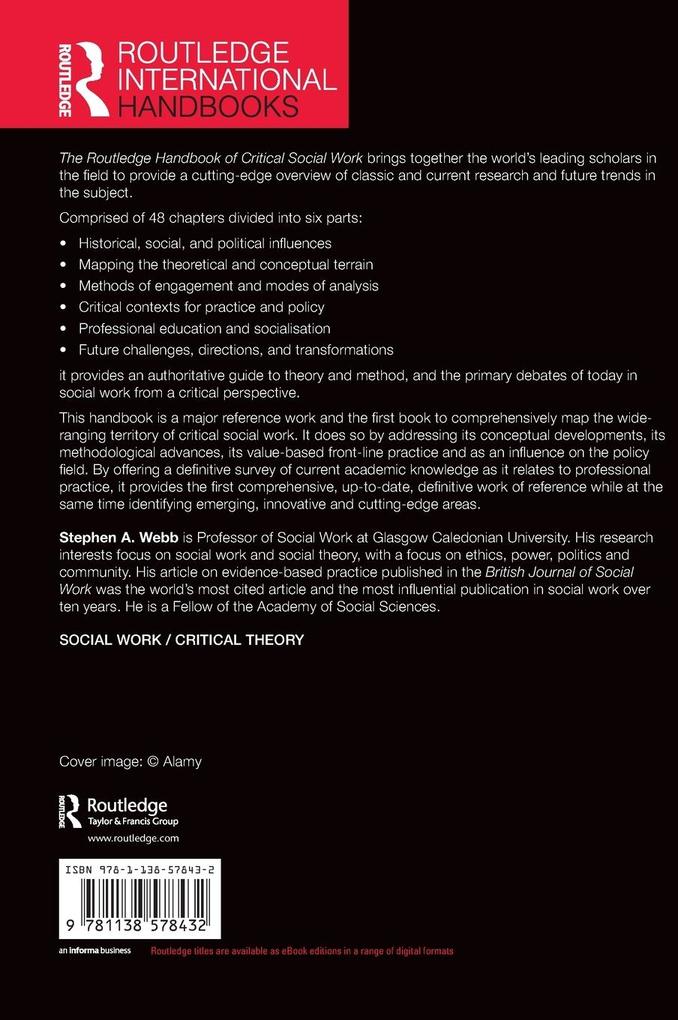
Zustellung: Mi, 21.05. - Sa, 24.05.
Versand in 1-2 Wochen
VersandkostenfreiBestellen & in Filiale abholen:
The Routledge Handbook of Critical Social Work brings together the world's leading scholars in the field to provide a cutting-edge overview of classic and current research and future trends in the subject.
Comprised of 48 chapters divided into six parts:
- Historical, social, and political influences
- Mapping the theoretical and conceptual terrain
- Methods of engagement and modes of analysis
- Critical contexts for practice and policy
- Professional education and socialisation
- Future challenges, directions, and transformations
it provides an authoritative guide to theory and method, and the primary debates of today in social work from a critical perspective.
This handbook is a major reference work and the first book to comprehensively map the wide-ranging territory of critical social work. It does so by addressing its conceptual developments, its methodological advances, its value-based front-line practice and as an influence on the policy field. By offering a definitive survey of current academic knowledge as it relates to professional practice, it provides the first comprehensive, up-to-date, definitive work of reference while at the same time identifying emerging, innovative and cutting-edge areas.
Inhaltsverzeichnis
List of contributors; Foreword: Critical social work and social justice - Jan Fook; Acknowledgements; Introduction: Critical social work and the politics of transformation - Stephen A. Webb; PART I: Historical, social and political influences; Chapter One Welfare words, neoliberalism and critical social work - Paul Michael Garrett; Chapter Two Neoliberal relations of poverty and the welfare state - Sanford F. Shram; Chapter Three Marxist Social Work: an international and historical perspective - Tom Vickers; Chapter Four Critical social work in the U.S.: challenges and conflicts - Michael Reisch; Chapter Five The rise of the global state paradigm: implications for social work - Paul Stepney; PART II: Mapping the theoretical and conceptual terrain; Chapter Six Critical theory and critical social work - Edward Granter; Chapter Seven Reimagining social theory for social work - Christopher Thorpe; Chapter Eight Anarchism and social work - Mark Baldwin; Chapter Nine Relational constructivism and relational social work - Björn Kraus; Chapter Ten Extending Bourdieu for critical social work - Stan Houston; Chapter Eleven Why psychosocial thinking is critical - Liz Frost; Chapter Twelve Feminist contributions to critical social work - Viviene E. Cree and Ruth Philips; Chapter Thirteen The politics of Michel Foucault - Paul Michael Garrett; Chapter Fourteen Resistance, biopolitics and radical passivity - Stephen A. Webb; PART III: Methods of engagement and modes of analysis; Chapter Fifteen Critical race theory and social work - Monique Constance-Huggins; Chapter Sixteen Indigenous peoples and communities: a critical theory perspective - Brent Angell; Chapter Seventeen Postcolonial feminist social work - Anne C. Deepak; Chapter Eighteen Critical discourse analysis and social work - Karen D. Roscoe; Chapter Nineteen Controversy analysis: contributions to the radical agenda - Natalia Farmer; Chapter Twenty Narrative analysis and critical social work - Sam Larsson; PART IV: Critical contexts for practice and policy; Chapter Twenty-One Green social work and political ecologies - Lena Dominelli; Chapter Twenty-Two Securitising social work: counter terrorism, extremism, and radicalisation - Jo Finch and David McKendrick; Chapter Twenty-Three Issues of ageing, social class, and poverty - Malcolm Carey; Chapter Twenty-Four Critical social work in the new urban age - Charlotte Williams; Chapter Twenty-Five Parents organizing a grassroots movement to reform child welfare - David Tobis; Chapter Twenty-Six Incorporating rurality into a critical ethics of intellectual disability care - Lia Bryant and Bridget Garnham; Chapter Twenty-Seven Neoliberal regimes of welfare in Scandinavia - Edgar Marthinsen; Chapter Twenty-Eight Performativity and sociomaterial becoming: what technologies do - Lucas D. Introna; Chapter Twenty-Nine Challenging scapegoating mechanisms: mimetic desire and self-directed groupwork - Stan Houston and Stephen Coulter; Chapter Thirty Vulnerability and the myth of autonomy - Ian Cummins; Chapter Thirty-One Food banks, austerity and critical social work - Sarah Pollock; Chapter Thirty-Two Ageing, veterans and offending: challenges for critical social work - Paul Taylor and Jason Powel; Chapter Thirty-Three "Do you really want this in front of a judge?" Translation and reversibility in practices of age assessment - Calum Lindsey; Chapter Thirty-Four Toward a multispecies home: bedbugs and the politics of non-human relations - Heather Lynch; Chapter Thirty-Five Adoption, child rescue, maltreatment and poverty - June Thoburn and Brigid Featherstone; Chapter Thirty-Six Critical debates in child protection: the production of risk in changing times - Emily Keddell and Tony Stanley; Chapter Thirty-Seven LGBT issues and critical social work - Urban Nothdurfter; PART V: Professional education and socialisation; Chapter Thirty-Eight Promoting activism and critical social work education - Christine Morley; Chapter Thirty-Nine Social work education and the challenge of neoliberal hegemony - Jane Fenton; Chapter Forty Embedding critical reflection across the curriculum - Fiona Gardner; Chapter Forty-One Contesting doxa in social work education - Liz Beddoe; Chapter Forty-Two Insinuating: understanding approaches to critical practice - Cynthia J. Gallop; Chapter Forty-Three Responding to neoliberalism in social work education: A neo-Gramscian approach - John Wallace and Bob Pease; PART VI: Future challenges, directions and transformations; Chapter Forty-Four Reprioritising social work practice: towards a reconnection of the personal and the social - Peter Beresford and Suzy Croft; Chapter Forty-Five Responding to political polarization: the new social work radicalism - Iain Ferguson; Chapter Forty-Six Popular social work - Michael Lavalette; Chapter Forty-Seven Challenging harmful political contexts through activism - Linda Briskman; Chapter Forty-Eight Imperialism, colonialism and a Marxist epistemology of 'critical peace' - Vasilios Ioakimidis and Nicos Trimikliniotis; Index
Produktdetails
Erscheinungsdatum
18. Januar 2019
Sprache
englisch
Seitenanzahl
654
Reihe
Routledge International Handbooks
Herausgegeben von
Stephen Webb
Verlag/Hersteller
Produktart
gebunden
Abbildungen
7 SW-Abb., 7 SW-Zeichn., 7 Tabellen
Gewicht
1406 g
Größe (L/B/H)
260/183/39 mm
ISBN
9781138578432
Entdecken Sie mehr
Bewertungen
0 Bewertungen
Es wurden noch keine Bewertungen abgegeben. Schreiben Sie die erste Bewertung zu "The Routledge Handbook of Critical Social Work" und helfen Sie damit anderen bei der Kaufentscheidung.











